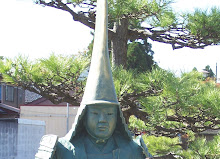Japan is now paying to send recently unemployed South Americans of Japanese ancestry back to their country of origin, because they don't want to pay for their social welfare, and its very important to the Japanese that these contract or "temporary" workers get the ax long before any full-time salaried Japanese worker does. Fair enough...Yet this goes right to the heart of Japan's long-term resistance to a racially-integrated society, along with its attempts to maintain a rigid social stability no mater what.
Michael Zielenziger argues in his excellent book Shutting out the Sun that Japan will face a slow and inevitable economic, political and cultural decline if it doesn't take action on the following three items:
- Open its borders to skilled immigrants who can help increase the sagging population, fill valuable employment vacancies and contribute to the tax base
- Allow foreigners to invest in Japanese companies
- Begin to teach English like you mean it (the way English in Japan is taught is a joke and everybody knows it); Fresh from a recent visit to Japan it seems that the country's English ability is actually in decline right now








1 comment:
Very interesting post. As far as I know South American people with Japanese ancestry are some of the most hardest workers in Japan. I see most of them working in fairly dangerous jobs such as construction.
The problem in this thinking is also how we define who is Japanese and who is not. If they have Japanese ancestors, I think they cannot be considered purely as "non-Japanese".
But then, watching the current political atmosphere in Japan, I am not least surprised about this move.
I certainly hope they don't extend this strategy to "unemployed spouses of Japanese nationals".
Post a Comment